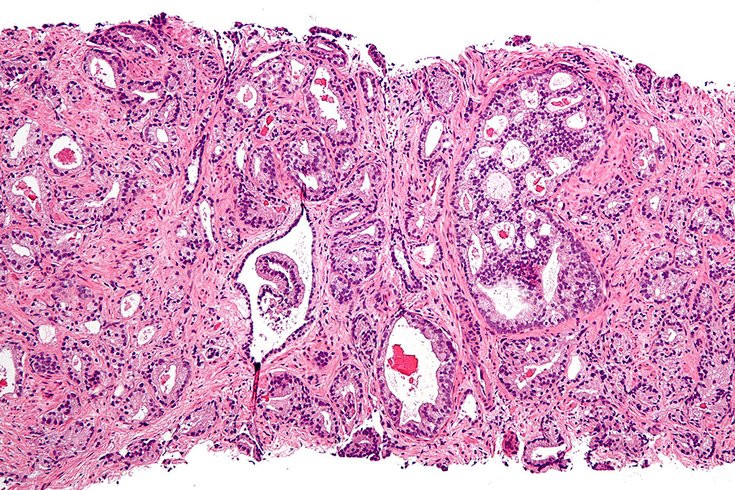
September 25, 2018
 Nephron/via Wikipedia
Nephron/via Wikipedia
Micrograph of prostate adenocarcinoma, acinar type, the most common type of prostate cancer.
Prostate removal remains an unpopular treatment for cancer patients, but new research indicates the procedure may help men live longer than more common treatments.
Prostate cancer patients who undergo a prostatectomy and receive radiation therapy tend to live longer than men who undergo radiation therapy and hormone-blocking therapy – the more common treatment, according to a study conducted by Jefferson Health.
The study, published Monday in the journal "Cancer," comes amidst Prostate Cancer Awareness Month.
Still, prostatectomy brings higher risks of incontinence and erectile dysfunction. Only six percent of men with high-risk prostate cancer undergo the procedure.
Researchers examined the records of 13,856 men in the Medicare-SEER registry who were diagnosed with locally advanced prostate cancer.
They compared the patients who were treated with prostatectomy and radiation therapy against those who received radiation therapy and hormone-blocking therapy. In comparing the groups, they matched patients based on age, race and co-morbidity.
Ten years after treatment, 89 percent of the patients who underwent a prostatectomy were still alive. Only 74 percent of the other group was still living.
"One of the strengths of retrospective studies of patient data is that it reveals what happens in the real world, rather than the carefully controlled context of a clinical trial," senior author Grace Lu-Yao said in a statement. "Our data is revealing the real-world practice as well as some of the advantages and disadvantages of those medical preferences."
Each year, nearly 165,000 men are diagnosed with prostate cancer – and some 29,000 die from the disease, according to the Prostate Cancer Foundation.
Prostate cancer does not initially present noticeable symptoms, but only 42 percent of men say they have discussed prostate cancer screenings with their doctor, according to the Prostate Cancer Foundation. Another 42 percent of men say they do not get screened because they have fears about digital rectal exams or worry they will feel uncomfortable.
If caught early, 99 percent of prostate cancer patients live at least five years after diagnosis.
The risk of developing prostate cancer increases exponentially with age. About 60 percent of prostate cancer cases are found in men older than age 65.
Follow John & PhillyVoice on Twitter: @WriterJohnKopp | @thePhillyVoice
Like us on Facebook: PhillyVoice
Add John's RSS feed to your feed reader
Have a news tip? Let us know.